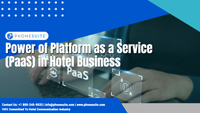
Introducing Platform as a Service (PaaS) & How It Can Benefit Hotel Businesses
Platform as a Service (PaaS) is a cloud computing model that provides a platform for building, deploying, and managing applications. PaaS providers offer a complete development environment that includes hardware, operating systems, and middleware, as well as tools for building and deploying applications. PaaS allows businesses to focus on developing and running their applications, without worrying about the underlying infrastructure.
For hotel businesses, PaaS can offer several benefits, including:
Scalability:
PaaS providers offer scalable infrastructure that can easily accommodate the changing needs of a hotel business. As a hotel business grows and expands, PaaS can scale to meet the demand for additional resources and capacity.
Cost Savings:
PaaS eliminates the need for businesses to invest in hardware, software, and other infrastructure components. This can result in significant cost savings, as businesses can pay for only the resources they need and can easily scale up or down as needed.
Flexibility:
PaaS provides a flexible platform that can accommodate a wide range of applications and programming languages. This allows hotel businesses to choose the tools and technologies that best suit their needs, without being limited by the underlying infrastructure.
Improved efficiency:
PaaS providers handle the management and maintenance of the underlying infrastructure, allowing hotel businesses to focus on developing and deploying their applications. This can improve efficiency and reduce the time and resources required to manage the infrastructure.
Security:
PaaS providers offer a secure platform that includes built-in security features, such as firewalls, encryption, and identity management. This can help hotel businesses to protect their sensitive data and applications from security threats.
Development Tools:
PaaS provides a set of tools, frameworks, and development environments that simplify the application development process. This includes programming languages, libraries, and integrated development environments (IDEs).
Database Management:
PaaS platforms often offer managed database services, making it easy to store and access data. This can be crucial for hotel businesses in managing guest information, reservations, and other data.
Application Hosting:
PaaS hosts and manages the applications, ensuring high availability, scalability, and reliability. This allows businesses to focus on coding and improving their applications, leaving the infrastructure management to the PaaS provider.
Examining The Cost-Effectiveness Of PaaS
PaaS can be a more cost-effective option than traditional methods of IT infrastructure management, depending on the specific needs and requirements of a business.
Here are some factors to consider when comparing the cost-effectiveness of PaaS to traditional methods:
Upfront Costs:
- Traditional IT infrastructure management often requires significant upfront costs, such as purchasing hardware, software, and licenses. PaaS eliminates these upfront costs, as businesses only pay for the resources they need, when they need them.
Ongoing Costs:
- PaaS providers typically charge a monthly or yearly subscription fee, based on the resources used. While these ongoing costs can add up over time, they can be more predictable and manageable than the ongoing costs of traditional IT infrastructure management, which can include maintenance, upgrades, and repairs.
IT Staff Requirements:
- PaaS providers handle the management and maintenance of the underlying infrastructure, which can reduce the need for businesses to hire and train IT staff. This can result in significant cost savings, particularly for smaller businesses.
Pay-as-You-Go Pricing:
- Most PaaS providers offer a pay-as-you-go pricing model, where you only pay for the resources and services you use. This flexibility can help you optimize costs.
- During low-demand periods, you can scale down resources and pay less, avoiding the need to pay for idle infrastructure.
Lower Development Costs:
- PaaS often includes development tools and frameworks, reducing the cost of building applications from scratch. This accelerates development and reduces labor costs.
- It can also simplify the development process, leading to fewer errors and reduced debugging and maintenance costs.
Faster Time-to-Market:
- PaaS accelerates the development and deployment of applications. This can translate into cost savings by allowing you to capitalize on business opportunities more quickly.
Reduced Risk of Downtime:
- PaaS providers typically offer high availability and redundancy. This reduces the risk of downtime, which can be costly in terms of lost revenue and damage to a business’s reputation.
PaaS can be cost-effective for many businesses, particularly those looking to reduce upfront infrastructure costs, streamline development, and scale resources efficiently. However, the actual cost-effectiveness depends on factors such as your specific use case, choice of PaaS provider, and your ability to effectively manage and optimize your cloud resources.
Understanding The Scalability Of PaaS
Scalability is one of the key benefits of PaaS for hotel businesses. With PaaS, businesses can rapidly adapt and grow as needed, without the need to invest in additional hardware, software, or infrastructure.
PaaS providers offer a scalable infrastructure that can easily accommodate the changing needs of a hotel business. This means that as a hotel business grows and expands, PaaS can scale to meet the demand for additional resources and capacity. For example, if a hotel business experiences a sudden spike in website traffic, PaaS can quickly scale up resources to handle the increased demand.
Scalability is achieved through a combination of factors, including:
Elasticity:
PaaS providers offer elastic resources, which means that businesses can easily scale resources up or down as needed. This allows hotel businesses to pay for only the resources they need, when they need them.
Automation:
PaaS providers use automation tools to manage and provision resources, which allows them to quickly and easily scale resources up or down based on demand.
Redundancy:
PaaS providers often use redundant systems and data centers, which can help to ensure high availability and uptime, even during periods of high demand.
Customizing Server-Less Environment For Maximum Control
While serverless computing is designed to abstract away the underlying infrastructure and provide a simple, easy-to-use platform for developers, there are still ways to customize your serverless environment for maximum control.
Here are some options to consider:
Customizable Function Runtimes:
- Many serverless providers allow developers to customize the runtime environment for their functions. This can include choosing the programming language, specifying dependencies, and even installing custom binaries. By customizing the runtime environment, developers can ensure that their functions have the necessary tools and libraries to perform their intended tasks.
Customizable Memory & CPU Resources:
- Most serverless providers allow developers to specify the amount of memory and CPU resources allocated to their functions. This can help ensure that functions have the necessary resources to handle expected loads, while also avoiding unnecessary over-provisioning and costs.
Customizable Event Sources:
- Serverless functions are triggered by specific events, such as HTTP requests or messages from a messaging system. Many serverless providers allow developers to customize the event sources for their functions, including configuring the event data and filters.
Customizable Deployment Pipelines:
- Many serverless providers allow developers to set up custom deployment pipelines, which can include automated testing, version control, and deployment strategies. By customizing the deployment pipeline, developers can ensure that their functions are deployed quickly, reliably, and securely.
Customizable Security Policies:
- Serverless providers often offer customizable security policies, which can help developers control access to their functions and data. This can include specifying permissions for specific users or roles, configuring encryption settings, and enabling network security measures.
Implementation Process: Getting Started with PaaS Technology In Your Hotel Business
The implementation process for getting started with PaaS technology in your hotel business can be summarized as follows:
Identify Your Business Requirements:
Determine what applications or services you need to host on the PaaS platform, as well as the level of scalability, security, and flexibility you require.
Evaluate PaaS Providers:
Research and evaluate different PaaS providers based on their pricing, features, and support. Consider factors such as ease of use, integration with other systems, and available resources.
Select The Right PaaS Provider:
Choose a PaaS provider that best suits your business needs and budget. Consider factors such as the programming languages and frameworks supported, data storage options, and security features.
Develop & Deploy Your Applications:
Use the PaaS platform to develop and deploy your applications or services. Take advantage of the platform’s built-in tools and features to streamline the development process and ensure that your applications are optimized for the PaaS environment.
Monitor & Optimize Your Applications:
Monitor your applications and services using the PaaS platform’s built-in analytics and monitoring tools. Use this data to optimize your applications for performance, scalability, and cost-effectiveness.
Train Your Staff:
Train your staff on how to use the PaaS platform and take advantage of its features. This can include providing documentation, tutorials, and hands-on training sessions.
Ensure Data Security & Compliance:
Implement appropriate security measures and ensure compliance with industry regulations when using PaaS. This includes encrypting data, restricting access to sensitive information, and ensuring compliance with data privacy regulations such as GDPR.
Regularly R& Update YPaaS Strategy:
As your business evolves, regularly review and update your PaaS strategy to ensure that it remains aligned with your business goals and requirements. This can include evaluating new features and capabilities of your PaaS provider, exploring new providers, and adjusting your usage based on changing business needs.
Leverage Support Resources:
Take advantage of the support resources offered by your PaaS provider, including technical support, documentation, and community forums. This can help you troubleshoot issues, optimize your usage, and stay up-to-date on new developments.
Choosing the Right VoIP Phone Service
Choosing the right VoIP (Voice over Internet Protocol) phone service is a crucial decision for individuals and businesses alike. To make an informed choice, consider factors such as call quality, reliability, scalability, pricing, and customer support. Evaluate your specific needs, such as the number of users and desired features like video conferencing, call forwarding, and mobile integration. Pay attention to experience, data security and compliance, and assess the flexibility of the service to adapt to future changes in your communication needs. Making the right choice can lead to cost savings, improved communication, and increased productivity for your business needs.
Business phone features are essential tools for organizations seeking to enhance communication and productivity. These features often include call forwarding, voicemail-to-email transcription, auto-attendants, and conferencing capabilities, enabling seamless and efficient interactions among team members and clients. Furthermore, advanced features like mobile integration, CRM integration, and call analytics empower businesses to streamline their operations, manage customer relationships, and make data-driven decisions, ultimately contributing to their success and competitiveness in today’s fast-paced business landscape.
Call Us Now!
All in all, PhoneSuite’s Connectware of hospitality products and services has proven to be incredibly valuable for businesses looking to make the most out of their operations. The portfolio of solutions can help keep customers satisfied with better service and communication, while also making sure your staff is connected and organized as needed. With this technology, businesses can become more efficient with their customer service management and keep up with the ever-changing digital world.
No matter what type of business you own, PhoneSuite has the right solution to help you reach success. Investing in these powerful products and services is a great way to spark growth amongst your team, prove effective hospitality communication strategies, and ultimately make strides towards better business that will keep your customers both happy and impressed.



